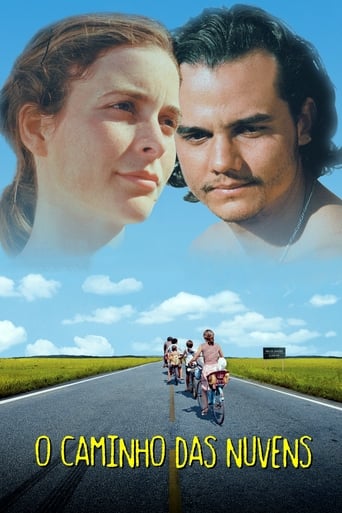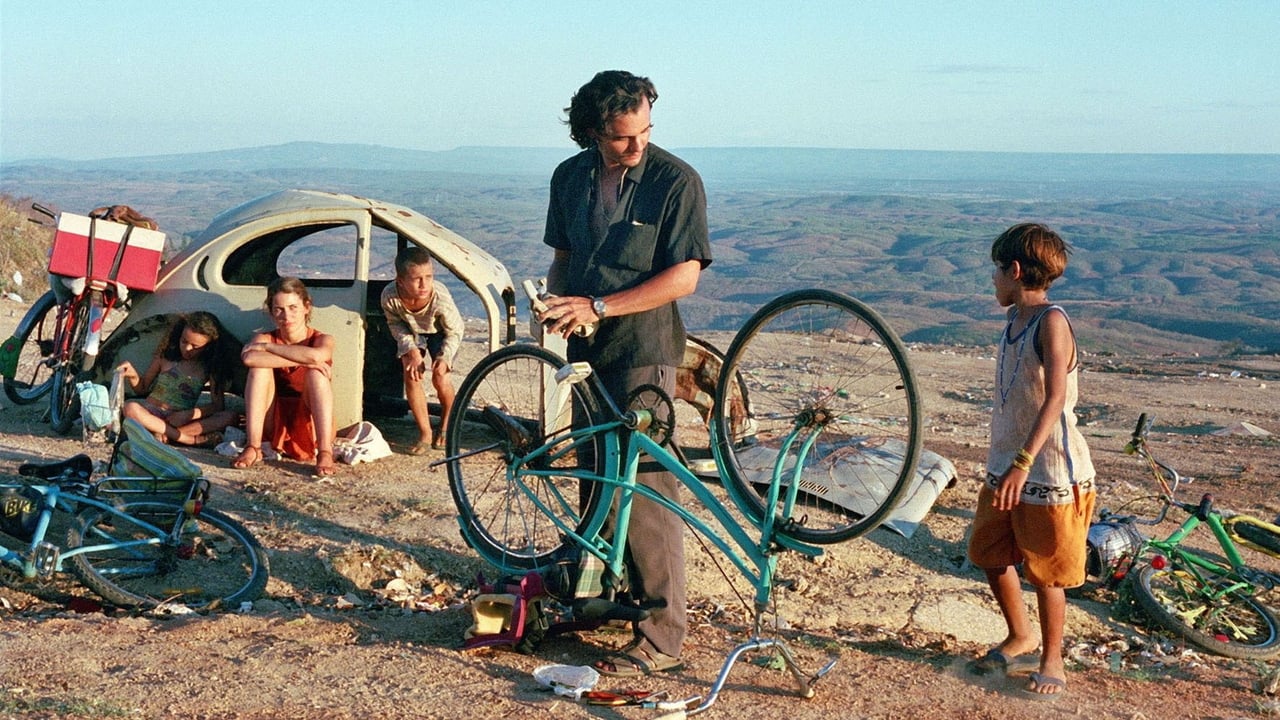irenaflux
Just saw the movie and was touched and traumatized. Beautifully made and very realistic. At first I got the idea of a visionary hard working father that wants to provide for his wife and children,soon to find out he is not...Those 5 kids just wonderful! All 5 of them! I loved the way they would all take turns caring for their little brother... The way they sang together with their mom in the middle of nowhere...and making the best out of the circumstances. Enjoyed the "rebel" on the older son and his failures...The mother was very talented just a bit too naive and submissive...maybe too in love with the looser... What did not sit well at all with me was how the father would let his family beg all along but would be ashamed of a little add job he got (temporary) where he could have earned at least a meal for his kids and not let them go to sleep hungry...The movie is dedicated to Roberto Carlos ( as in the singer)? and why would that be for?
meddlecore
Part "Road Movie" and part "Coming-of-Age" film, "O Caminho Das Nuvens" is an enjoyable little Brazilian flick that tells us the story of Ramao, his wife Rose, and their 5 children, as they make their way from "The Middle of the World" in Paraíba to Rio de Janeiro, on bikes, in search of work and a place to settle down.Shot in Neorealist tradition- similar to film's like De Sica's "Bicycle Thief"- we are not shown the beginning of the family's journey, nor it's conclusion...but, rather, are offered a privileged glimpse into a "slice of (this poor family's) life". The characters are real/regular people, and as such, could represent any one of the countless number of families' that have made similar journeys from rural Brazil to major urban centers like Rio and Sao Paolo, in search of new oppourtunities and a "better life".From the start, we are privy to the fact that the family has no set destination, little direction, and even less money to survive on. It seems that Ramao has dragged his family on this epic excursion based on a whim, and a slightly psychopathic desire to find a job that pays "1000 reisas a month"- which he feels he will need in order to take care of his large family.We follow Ramao and his family and observe the trials and tribulations that they must endure during the six month exodus they have embarked on...To get by the family relies on the generosity of others...begging, panhandling, busking and doing odd jobs that will earn them enough cash to keep food in their bellies. Ramao acts quite callously toward his family, for a man that relies on them for money and survival. These feelings of inadequacy are likely a consequence of his inability to provide for his family.Tension starts to develop between Ramao, his wife, and their eldest son Antonio, as Ramao repeatedly refuses job oppourtunities that do not meet his moral or monetary expectations. This is exacerbated when he decides to extend their journey, despite pleas from his tired and hungry family.As Ramao comes to grips with the fact that his dreams and expectations are, in all likelihood, not going to be realized, the film begins to focus on the relationship with his teenage son Antonio.At the beginning of the film, Ramao treats Antonio like he is an unwanted burden- constantly putting him down- though it seems the family wouldn't be as safe without him. We watch as Antonio becomes more independent; getting his coming-of-age experiences at various stops made by the family along the way. By the second half of the film it becomes clear that, despite their somewhat tenuous relationship, Ramao has been trying to get Antonio ready for life on his own.As the family nears their next (final?) destination, the film goes out on an emotional note....though we never do find out what fate has in store for them. I guess this is a comment on, "life being about the journey, not the destination"."The Middle of the World" is a simple, heartwarming film about a family on a journey. The locations and cinematography are beautiful and the acting is pretty good. It's also worth mentioning that the actor playing Ramao (Wagner Moura) looks a helluva lot like Johnny Depp!!! Definitely worth a watch, 6.5 out of 10.
dredyoung
A great Brazilian movie called "The Middle of the World", which, in fact, it is in so many ways. It is a rich but unpretentious chronicle of an extraordinary journey of one rural Brazilian family. The father is illiterate and unable to find work. Romão (the father), Rose(the mother), and their five children, from a teen to a baby, begin to make a journey on bicycles and head for Rio de Janeiro, which is 2,000 miles away, to find work. They face all kinds of physical and emotional hardships along the way, seeing many kinds of villages, dirt roads and superhighways, and desolate to spell binding scenes of nature. They beg, do odd jobs, sing in outdoor cafés for money, scrounge around in old abandoned homes, swelter under the blazing sun, almost die of thirst, and sleep under the stars; yet all the while, they keep trying to survive and maintain their love for each other, which is often tested beyond limits. The husband and wife relationship has classic features that are displayed poignantly and expertly. They exhibit a kind of yin and yang pattern with Romão being a strong, soft spoken, intensely patient, idealistic optimist and Rose being the one who verbalizes their feelings of love, sympathy, joy, as well as despair, fear, and anguish. She is also outspoken when their frailties have been overtaxed and when there is a need to be practical. Her pragmatism and his religious convictions balance each other out. Nevertheless, they are able to switch roles as the one to comfort, encourage, or recommit to the challenge when either has had enough and is losing hope and faith in their vision. With no competition from age-group peers, the character of their parents seems to be emulated as role models by the children. As a sub-plot, the teenager, Antonio, is in the middle of growing into manhood. The Father, Romão, exercises patient parental control through mild rebukes and testing Antonio's mettle by letting him use his judgment and make mistakes, but he also subtly guides him with silent looks of acknowledgement that builds Antonio's confidence in himself. Rose, the mother, gives equal guidance by emphasizing caution and protectiveness but also gives him a sense of profound mother-love that becomes his foundation of security. When the father senses Antonio is ready to emancipate, the mother does not want to let go and the father, in his wisdom-love, states simply and firmly to Rose, "We do not own our children." When Antonio is left behind to follow an occupation, the strong and positive family dynamic continues to the end of their journey. Finally, when at their destination of Rio de Janeiro, and expressing the powerful spirit of this family, their triumph is symbolized in a mountain top experience as they stand together viewing Corcovado's Statue of the Christ and overlook the prize of their victory, the city of their dreams. As they crossed the 2,000 miles of their courageous journey, they witnessed the many ways in which the nation they once knew is rapidly changing. It was a raw, earthy, beautiful story. It gave such a realistic picture of Brazil as a whole. It is a beautiful country but also has such vast differences between the rich and poor. The movie also showed what a big and truly dominant role religion, and religious superstitions, plays in the lives of the poor, illiterate 'peasants'. At 'The Middle of the World', two different worlds, the new cosmopolitan and the old world, stand on the same piece of earth!
dirk breedveld
it's the best road movie after Thelma and Louise. It's lovely in tempo, pictures, acting performance even of the very small kids, nice music, good mixture of action, drama, laughter, hope and despair, and getting out of your life the best possible....


 AD
AD


